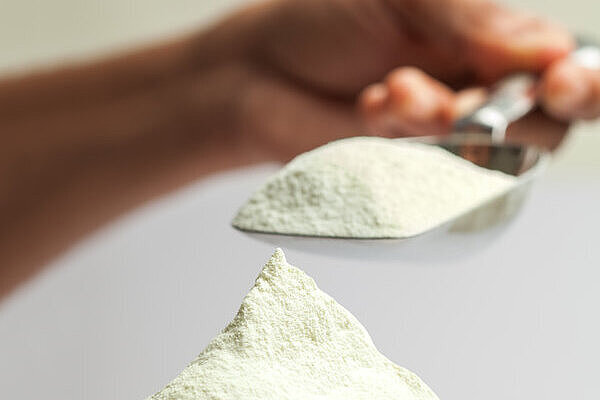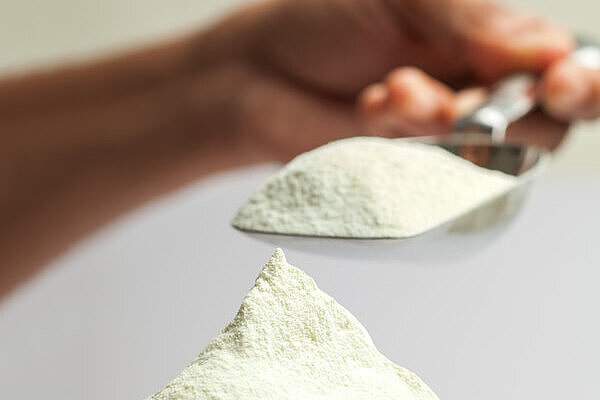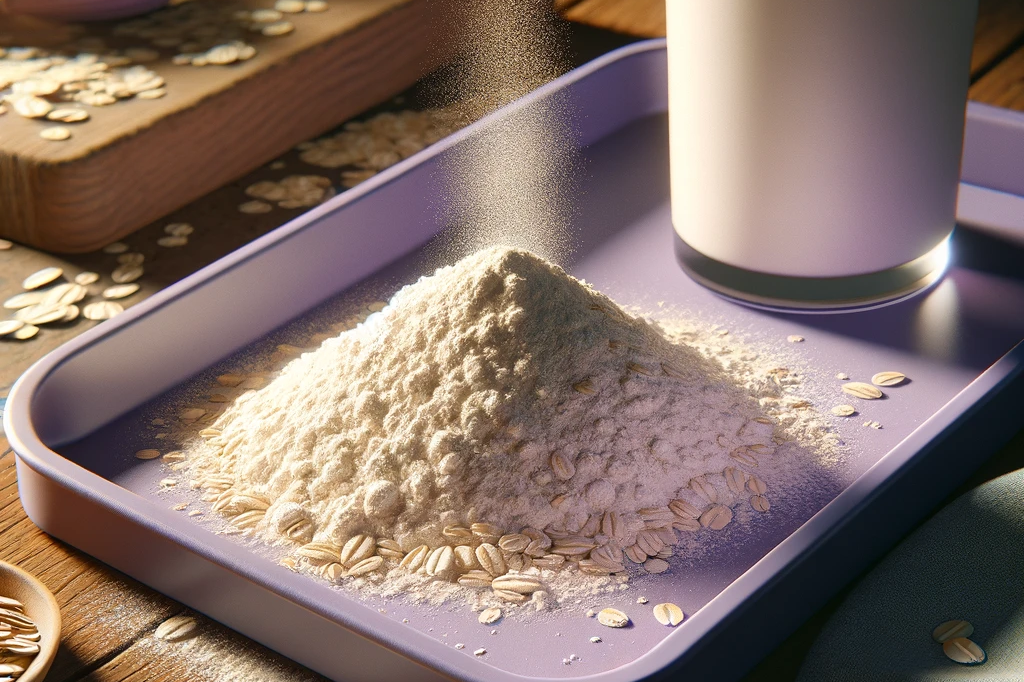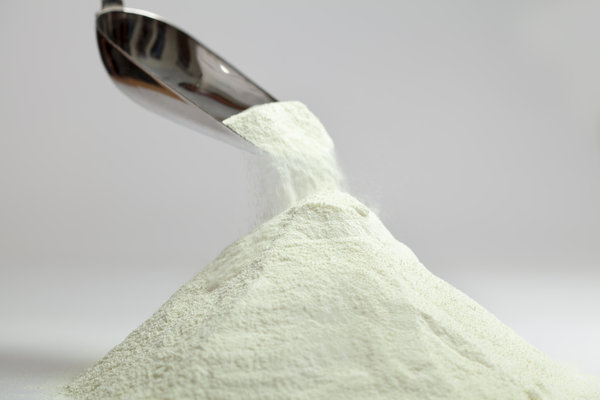Whey powder
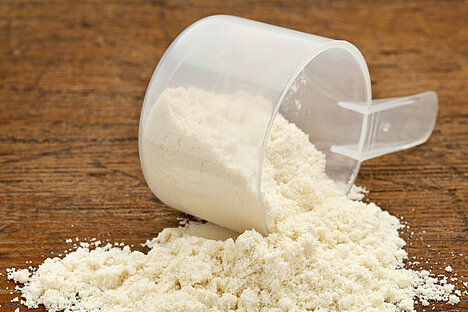
What is whey powder?
Whey powder is a powder obtained by drying whey. Whey is the yellowish liquid that is produced during cheese production when the milk coagulates and separates into solid components (curd) and liquid components (whey). Whey consists mainly of water, but also of proteins, lactose (milk sugar), vitamins and minerals. The whey can be further processed using various methods to obtain different types of whey powder. The best known are
- Sweet whey powder: this is the simplest and cheapest whey powder obtained by drying sweet whey. It has a high lactose content (approx. 70%) and a low protein content (approx. 12%).
- Skimmed milk whey powder: This whey powder is produced by drying skimmed milk whey, which is obtained from skimmed milk. It has a lower lactose content (approx. 50%) and a higher protein content (approx. 35%) than sweet whey powder.
- Whey protein isolate: This whey powder is made by filtering whey to reduce the lactose and fat content and increase the protein content. It has a very low lactose content (approx. 1%) and a very high protein content (approx. 90%).
- Whey protein concentrate: This whey powder is produced by concentrating whey to increase the protein content. It has a low to medium lactose content (approx. 5-20%) and a high protein content (approx. 70-80%).
What are the benefits of whey powder for dogs?
Whey powder can have various benefits for dogs, depending on the type and amount of product. The most important are
- Protein source: Whey powder is a high-quality protein source for dogs that contains all the essential amino acids. Protein is important for building and maintaining muscle, skin, hair, nails and other tissues in the body. Protein can also strengthen the immune system and promote wound healing.
- Source of vitamins and minerals: Whey powder contains many vitamins and minerals that are important for the health of dogs. These include vitamin A, B vitamins, vitamin C, vitamin D, vitamin E, calcium, iron, magnesium, phosphorus, potassium, zinc and selenium. These nutrients can support growth, development, digestion, nerve function, hormone production and antioxidant activity.
- Digestive aid: Whey powder can improve digestion in dogs by promoting the growth of beneficial bacteria in the gut. These bacteria can help process food, strengthen the immune system and fight infections. Whey powder can also stimulate intestinal motility and prevent constipation.
- Appetite stimulant: Whey powder can increase the appetite of dogs suffering from illness, stress or ageing. Whey powder has a pleasant taste and smell that can increase food intake. Whey powder can also improve the energy and well-being of dogs by providing them with important nutrients.
What are the disadvantages of whey powder for dogs?
Whey powder can also have some disadvantages for dogs, depending on the type and amount of the product. The main ones are:
- Lactose intolerance: many dogs are lactose intolerant, meaning they cannot digest the lactose in whey. This can lead to digestive problems such as flatulence, diarrhea or vomiting. To avoid this, you should only use whey powder with a very low lactose content, such as whey protein isolate or whey protein concentrate.
- Allergy: Some dogs can have an allergic reaction to whey or other components of whey powder. This can lead to skin rashes, itching, breathing difficulties or other symptoms. To avoid this, consult a vet before using whey powder and introduce the product slowly.
- Overdosing: Too much whey powder can be harmful to dogs as it can lead to an oversupply of protein or other nutrients. This can put a strain on the kidneys or lead to metabolic disorders. To avoid this, the recommended dosage of whey powder should be adhered to and the product should not be used as a substitute for a balanced diet.
How to use whey powder for dogs?
Whey powder can be used for dogs in different ways, depending on the purpose and preference. The most common are:
- As a food additive: you can add whey powder to your dog's normal food to increase the nutritional value or improve the taste. The dosage should be adjusted according to the dog's weight, activity and health status. A general guideline is to give about 1 gram of whey powder per kilogram of body weight per day.
- As a treat: You can use whey powder as a treat to reward or motivate your dog. Care should be taken to ensure that the treat is not too big or too hard to avoid choking or swallowing. You should also reduce the amount of treats in relation to the normal food to avoid overfeeding.
- As a liquid: You can mix whey powder with water or milk to make a liquid for the dog. This can be useful for hydrating the dog or administering medication. Care should be taken to ensure that the liquid is not too hot or too cold to avoid burning or freezing. You should also adjust the amount of liquid in relation to the dog's normal water requirements.
Whey powder is a product that comes from cheese production and contains many proteins, vitamins and minerals. It can have various benefits for dogs, such as improved digestion, increased appetite or increased energy. However, it can also have some disadvantages, such as lactose intolerance, allergy or overdosing. To minimize these risks, you should only use high-quality whey powder with a low lactose content and adhere to the recommended dosage.
Properties 7
Are you looking for other ingredients with a specific property?
Just click on them to find more.
If you notice any signs of hypersensitivity or poisoning in your dog, you should see your vet immediately. We are not a substitute for a vet, but we try to be as accurate as possible. Every dog reacts differently and we recommend you get a second opinion or consult your vet if in doubt.
Stay healthy and take good care of your four-legged friend!😊
Similar to Whey powder
Whole milk has a water content of around 87.5%. This is reduced to around 3% for powder production (non-free water). Around six to seven liters of milk are required to produce one kilogram of whole...
Milk powder is a product made by evaporating the water from milk. The solid components of the milk, such as protein, fat, carbohydrates, vitamins and minerals, are retained. The advantage of milk...
Oat milk powder is made from whole grain oats that are first soaked in water, then ground and finally dried into a fine powder. This powder can then be mixed with water to make oat milk or used...
Skimmed milk powder is a dairy product made by removing water and fat from milk. It has a lower energy content than whole milk and contains fewer fat-soluble vitamins. However, it has a longer shelf...
